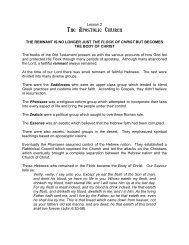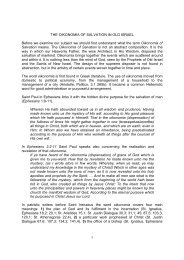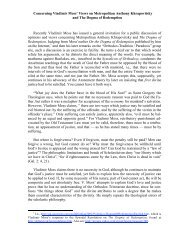Father Maximus - Saint Nektarios Greek Orthodox Church
Father Maximus - Saint Nektarios Greek Orthodox Church
Father Maximus - Saint Nektarios Greek Orthodox Church
Create successful ePaper yourself
Turn your PDF publications into a flip-book with our unique Google optimized e-Paper software.
In baptism we are initiated into the life, death, burial, and resurrection of<br />
Christ, but in Holy Communion, we partake of the fullness of the life of Christ.<br />
That is why the Eucharistic canon which the priest recites during the Liturgy<br />
contains a summary of the life of Christ, for in Communion we participate in all of<br />
Christ’s actions. In Communion the fact of us being one Body with Him is<br />
realized and made manifest. Naturally, the summit of this is His death and<br />
resurrection; and the Eucharistic sacrifice is not a repetition of Christ’s sacrifice,<br />
but a making present of it. Thus, even as Christ accepted death upon Himself, and<br />
in so doing overthrew it – for death could not hold the hypostatic Life Himself –<br />
so we partaking of the immaculate Mysteries are raised up into the glory of<br />
Christ’s resurrection. In both baptism and communion and in all the sacraments,<br />
we receive God’s grace in proportion to the level of our purity, which is why we<br />
must prepare ourselves to receive the sacraments and why the sacraments cannot<br />
be divorced from the ascetic life. For asceticism is both the means of purification<br />
from the passions and also, for the baptized, a participation in the suffering and<br />
death of Christ. For one who is still being purified this may not seem so obvious,<br />
but the person who has become a vessel of the Holy Spirit perceives clearly the<br />
union of his own life with Christ’s life. This is why it is the priests – that is; those<br />
whose way of life is proven to be holy – who perform the sacraments.<br />
The scheme and order I have outlined should not be taken as a rigid pattern<br />
which is always followed without variation. It is simply a generalization based on<br />
the usual order the spiritual life takes. In most people the actual events of one’s





